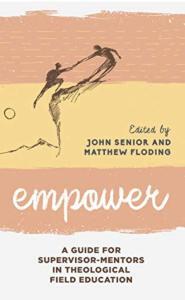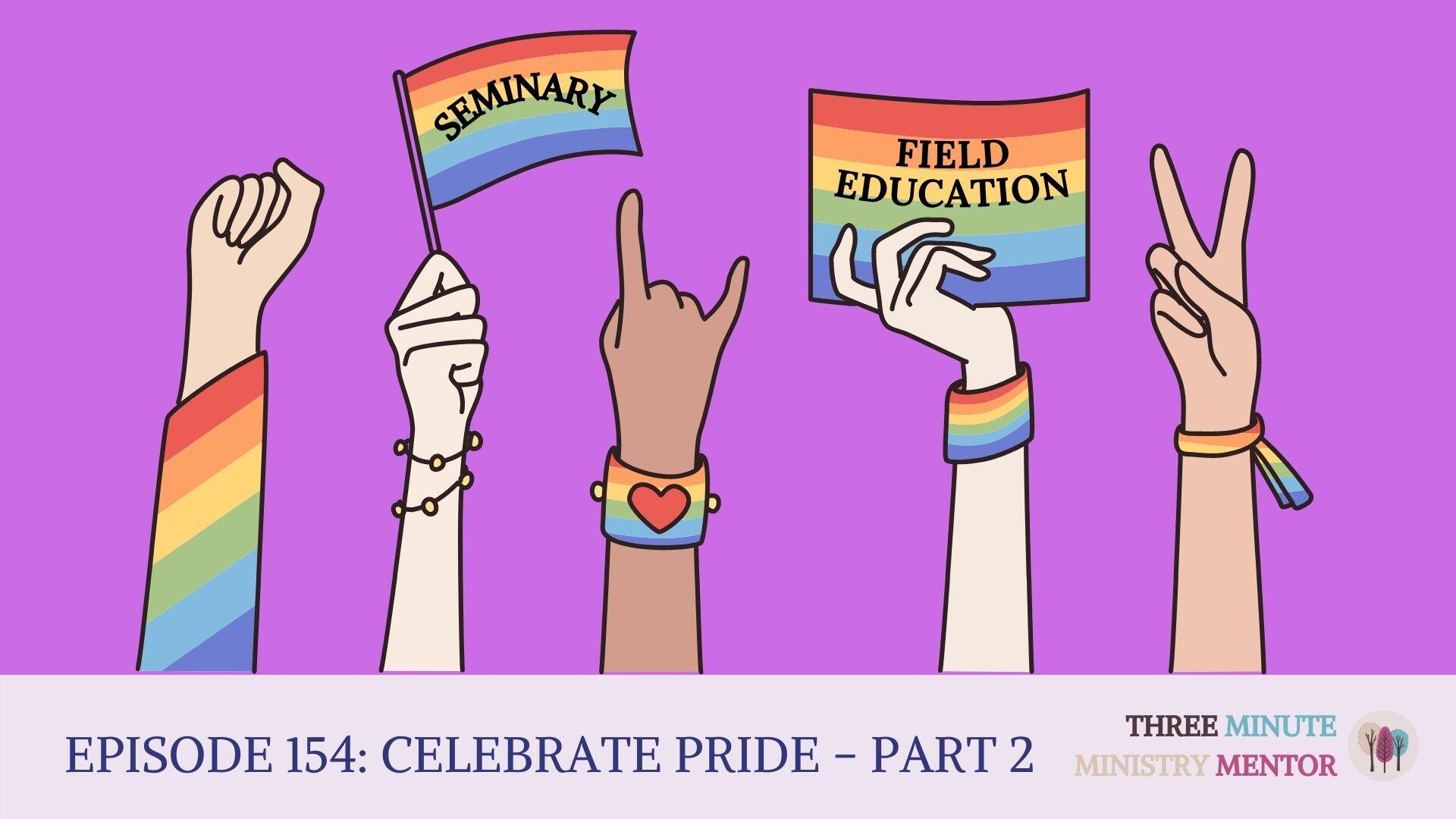Welcome to Part 2 of Celebrate PRIDE this week! We are sharing stories of ministers who identify as LGBTIQA+ in the Learning Pastoral Imagination (LPI) Project. This week we drop in on two ministers at the stage of deciding on seminary and finding a field placement.
When we share stories from our research, we believe it holds up a mirror for other ministers. When you see your experience reflected, it can help you feel seen and heard. It can reduce the sense of isolation.
We are deeply grateful for the lives and ministries of Tim, Georgine, Naomi, Theresa, and Esther, and other LGBTIQA+ ministers.* And we are also grateful for their willingness to let us share those stories widely.
Each story narrates how clergy are on the double journey of coming out as LGBTIQA+ and responding to a sacred call to ministry. Each of these journeys has multiple unique challenges, and together they require courage, trust, support, and yes, pastoral imagination.
PRIDE Week at 3MMM
This week we want to share stories that highlight the courage and fortitude of ministers in the LPI study who identify as lesbian, gay, bisexual and/or queer.
- Coming Out (Monday)
- Attending Seminary & Field Education (Wednesday)
- First Call and Second Call (Friday)
For this week only we are sending out three emails. (Fear not. We will not be emailing you every day. We aren’t equipped for that!) However, we think celebrating PRIDE is worth at least three emails this week! We hope you will be inspired by the stories of LGBTIQA+ ministers. Celebrate PRIDE with us!
Getting to Seminary: Georgine’s Story
 “Ministry was never really on my radar,” recalls Georgine. She grew up in Kentucky attending a Church of God (Anderson, Indiana) congregation. And although the Pentecostal denomination has a fair number of women preachers and pastors, Georgine did not feel drawn to it.
“Ministry was never really on my radar,” recalls Georgine. She grew up in Kentucky attending a Church of God (Anderson, Indiana) congregation. And although the Pentecostal denomination has a fair number of women preachers and pastors, Georgine did not feel drawn to it.
At several pivotal points in her life, she heard the quiet question “Have you considered seminary?” But Georgine wanted to be an attorney or a doctor. She doesn’t “do blood,” so law school it would be.
Georgine was in her early forties when we met her on an LPI interview day in the northwestern United States. She had reached her goal, graduating from Howard University undergrad and law school. “When I stand on Howard’s campus,” she recalls, “what I know is that as an African American, I stand on the shoulders of those who have gone before me and that many of those people died for me to sit there. This gives me chills.”
She was an attorney with a small private practice. But Georgine was also about to graduate from seminary. Wait, what?
After law school, Georgine moved to the West Coast to begin her career in law and in the process found a new sense of self and belonging. One year turned into eighteen. She found work and a new life partner. When she went through the process of coming out as lesbian, she also found herself feeling further alienated from the church of her childhood.
Returning to Church and Seminary
Georgine recalls, “I still knew many ministers who felt as though homosexuality was a sin and an abomination.” Their message to her? “You’re on the express train to hell. Don’t pass go, do not collect $200, go directly.” Undoing this thinking became part of a long process of returning to church and seminary.
Along the way, Georgine spent years exploring her spirituality without the church. She had grown tired of feeling “pelted from the pulpit.” So for thirteen years, she found spiritual nurture in places as divergent as Buddhism and the Nation of Islam. She found the most spiritual support in AA when she decided to choose sobriety. Her relationship with God never faltered through this journey—it only deepened.
When she felt an urge to return to church, Georgine began setting criteria and making a list of churches to try. “Nobody wants to go to church on Sunday and be preached at, preached under, or demeaned. I thought, you know, that’s going to be a tricky thing because coming out of an African American tradition, many of our churches are fundamentalist. And I can count the number of times on one hand where I’ve been in an African American church and not felt as though there was us and them. There had to be somebody under us in order to be above somebody else. And in that community, homosexuals are the them.”
Nobody wants to go to church on Sunday and be preached at, preached under, or demeaned.
++++++
Yet she still craved “community, connection, and fellowship of people,” so she started visiting the congregations on her list, slipping in through the back and ready to bolt if she didn’t like what she heard. Eventually, she found a Disciples congregation with a female pastor, and she stopped working through her list. She found her home and community of faith.
Not only did Georgine find a church community. She also found her preaching voice, and a clear call to attend seminary. Read more of Georgine’s story in chapter 38 “Action Reflection for Preaching” in Pastoral Imagination.
Excerpt from: Eileen Campbell-Reed, Pastoral Imagination (Fortress Press, 2021, 239-240).
We are continuing with our #Pride2022 Celebration at #3MMM this week. We have another question for you faith leaders. Tell us how you do this work! pic.twitter.com/6ZWTdCb5K8
— Three Minute Ministry Mentor (@3MinuteMin) June 15, 2022
Questions:
+How does your faith group strive to make community, connection, and fellowship for all, including people who identify LGBTIQA+?
+ How and when do you ask the gifted young people in your church: have you considered seminary? What is God calling you to do with your life?
Field Education: Naomi’s Story
A growing number of seminaries make room for students who identify as LGBTIQA+. However, the Association of Theological Schools in North America (ATS) does not keep statistics. So evidence of growth or change is anecdotal. Certain schools, like my alma mater Vanderbilt, and at my current teaching school Union, make the commitments clear.
In this story we meet Naomi, who is in her 20s. She identifies as white and lesbian, having grown up in a Mennonite family in the Midwest. She was a recent Vanderbilt graduate when we first interviewed her.
Theological field education (TFE) faculty and staff aim to create the conditions that will allow for positive mentoring toward a robust pastoral imagination. From my experience as a researcher and field education professor, I believe three areas of TFE are especially significant for transforming the ecology of teaching and learning such that it supports the long arc of learning the practice of ministry over time: 1) supportive mentors and supervisors who can make the right kind of learning space, 2) contracts and covenants that clarify the learning goals and expectations for a ministry placement, and 3) assignments, especially case studies, that formalize and seal in the learning of practical wisdom or pastoral imagination for students.
Finding a Place to Serve

Three years after Naomi’s powerful moment of pastoral calling, she found herself sitting in the field education office of Viki Matson at Vanderbilt Divinity School. Naomi was two years into her seminary education and wondering how she would find a congregational internship. Professor Matson has deep knowledge about the kind of settings students need for flourishing, and she maintains a wide ecumenical network.
The Mennonite world is relatively small, and having come out as lesbian in college, Naomi knew her options for service in a Mennonite congregation were limited. Naomi and her professor wrote letters to three congregations seeking a summer internship. One of those churches responded, and they began a phone interview process.
The urban Mennonite congregation makes decisions by consensus.[i] In a congregational meeting to decide about calling Naomi as their intern, a young person rose to speak, saying, “I can’t imagine being called to ministry and not having a place to serve. And I hope when I get to where Naomi is, that there is a church that welcomes me in.” Naomi says no one stood aside at that meeting.[ii]
To read more about what Naomi learned in her summer internship, you can read her story in the LPI Five-Year Report and in my chapter in this new book:
Eileen Campbell-Reed, “Mentoring for Pastoral Imagination” in Empower: A Guide for Supervisor-Mentors in Theological Education, ed. by John Senior and Matthew Floding (Rowman & Littlefield, 2020)
An Encouraging Postscript
This spring, more than a decade after Naomi found her first summer internship, the Mennonite Church, USA considered “A Resolution of Repentance and Transformation.” The statement is longer on confession and repentance. And perhaps rightfully, it is more modest on transformation. However, the resolution aspires to include LGBTIQ persons, follow them willingly, and make changes to policy and theology.
Surprising to both insiders and people beyond the MCUSA, the resolution passed on May 29, 2022. In this PRIDE week and month, we will take it as a point of gratitude and celebration.
Questions:
+How do organizational structures maintain beliefs, practices, policies, and traditions that marginalize women and LGBTQIA folks? (Pastoral Imagination “Questions For Redemptive Change”)
+What risks and responsibilities are you willing to embrace in order to make changes toward full inclusion, celebration, and leadership of LGBATIQA+ friends and family?
*All names and identifying information in the LPI study are pseudonymous.
[i] A helpful site for understanding consensus decision making: https://www.seedsforchange.org.uk/consensus
[ii] Within the consensus model, “standing aside” is a form of refusal to take part in a decision that the majority is moving to adopt.




